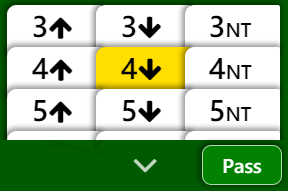Trickster Whist offers both Classic Whist and Bid Whist. Classic Whist does not have bidding whereas Bid Whist does. We describe each separately below starting with Classic Whist.
Whist is a partnership trick-taking game where players strive to win the most tricks possible. It is played with a standard 52-card deck where Ace is high. Trump is chosen randomly to be the suit of the last card dealt.
The team that takes the most tricks each hand is awarded one point for each trick over six. For instance, if a team takes 8 tricks, they score 2 points (8 – 6 = 2).
Classic Whist can be played with an optional honours bonus (see Whist Rules). If enabled, the team holding 3 of the 4 trump honours (Jack, Queen, King, or Ace) is awarded an extra 2 points. If holding all 4 trump honours, they are awarded 4 points. Note that this bonus is earned based on cards dealt, not cards captured.
The first team to get to the game-over score (5, 7 or 9), wins.
Bid Whist is a partnership game where players bid to determine trump, specify the number of tricks they expect the partnership to take, and whether high cards or low cards win the trick (“uptown” or “downtown”).
The team winning the bid and making their bid earns one point for each trick over six. Failure to capture the number of tricks indicated by the bid results in the bid level being subtracted from their score.
The game is over when either team reaches the game-over score (5, 7 or 9) or the negative of the game-over score (−5, −7 or −9). The team with the higher score wins.
Bid Whist is commonly played with a 54-card deck: the standard 52-card deck plus two Jokers, one red and one black with the red Joker being the highest rank.
Trickster Whist offers a game option to set the number of jokers to 0, 1 or 2 (see Whist Rules).
Twelve cards are dealt to each player. The remaining cards are left undealt and comprise the kitty. These are counted as the first trick taken by the team that wins the bid.
Depending on the number of jokers, the kitty will be 4, 5, or 6 cards.
Following the deal, starting with the player left of the dealer, each player has one opportunity to bid. Initial bids consist of a level and an indication of how the hand will be played. These indications are “NT” for a no trump hand or a down-pointing or up-pointing arrow.
The down-pointing arrow indicates a trump bid that will be played “downtown,” meaning the rank of the cards high-to-low will be Red Joker, Black Joker, Ace, 2, 3, 4, 5, 6, 7, 8, 9, 10, Jack, Queen, and King.
The up-pointing arrow indicates a trump bid that will be played “uptown,” meaning the traditional ranking of cards high-to-low: Red Joker, Black Joker, Ace, King, Queen, Jack, 10, 9, 8, 7, 6, 5, 4, 3, and 2.
The “level” of the bid means the bidder must take 6 + level number of tricks to win the hand. For example, a level 3 bid means that 9 or more tricks must be taken to win the hand (6 + 3 = 9). Note that one trick is awarded “free” for winning the bid, representing the kitty.
Subsequent bids must be higher than previous bids. Higher levels beat lower levels. Within a level, downtown beats uptown and NT beats downtown.

Initial bid options with 4 downtown suggested
The winner of the initial round of bidding then has a second choice. If the winning bid was NT, the second choice is whether to play it uptown or downtown. If the winning bid was a level with uptown or downtown, the second choice is the suit to make trump.

2nd choice after a 4NT initial bid

2nd choice after a 4 downtown initial bid
If, during the initial round of bidding, the first three players pass, the dealer must bid.
After the bid is set, the player left of the dealer leads the first trick.
Play continues clockwise following the led suit, if possible, or playing any other card if not. When all four players have played, the trick is taken by the player who played the highest trump, if any, or the player who played the highest card of the led suit.
Note that if playing “downtown,” the rank of the cards from high to low is Red Joker, Black Joker, Ace, 2, 3, 4, 5, 6, 7, 8, 9, 10, Jack, Queen, and King.
However, if the bid is no-trump, the jokers have no value and cannot win a suit in which they are played. If a player leads a joker, the suit of the trick is determined by the first non-joker played in that trick. These two rules means that the jokers are worthless in a no-trump contract.
The team that won the bid and takes at least the number of tricks implied by the level (6 + level) is awarded points equal to the number of tricks taken over 6. However, if they fail to take the minimum number of tricks required, the level is subtracted from their score.
For example, a team that bids level 4 and takes 11 tricks is awarded 5 points (11 – 6 = 5). However, if they fail to take at least 10 tricks, 4 points are subtracted.
The team that did not win the bid scores nothing.
The game is over when either team reaches the game-over score (5, 7 or 9) or the negative of the game-over score (−5, −7 or −9). The team with the higher score wins.
If you don’t see your favorite variation or rules listed, use the “More Games/Rules…” button at the bottom of the list of available rules and customize them the way you want. View the available house rule options in Whist Rules.